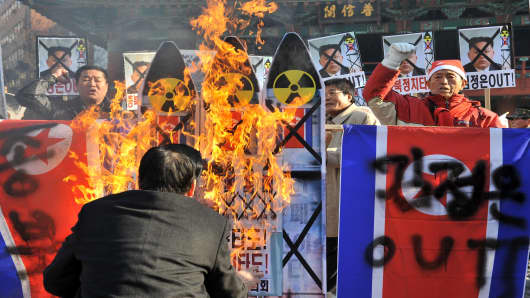There was anger and dismay after North Korea launched a long-range rocket into orbit on Wednesday -- plenty of it in South Korea and Japan. There was also surprise.
North Korea had warned of a possible delay to the launch for "technical reasons," although there was speculation that the real reason was political, that China was applying pressure behind the scenes. After all, Beijing had expressed "deep concern" over the test, and that is pretty strong for China, the North's closest diplomatic and economic ally.
So Wednesday's test would seem to be an extraordinary snub to China, when it might be assumed that North Korea's new young leader, Kim Jong Un, would want to get off on a good footing with China's new Communist Party chief, Xi Jinping.
North Korea watchers have been speculating that Kim is angling for an early audience with Xi, which so far has been denied.
(Read more: China Party Chief Stresses Reform)
Launching a rocket in defiance of Beijing would hardly seem a great way of achieving it.
Beijing's initial response was a masterful piece of diplomatic contortionism -- expressing "regret" and calling on Pyongyang to abide by U.N. Security Council resolutions, but at the same time making clear that China isn't about to back sanctions against the North.
A Foreign Ministry spokesman called for a resumption of six-party talks, even though these have been widely discredited, and called for "all sides" to act calmly.
International talks are a big favorite of Beijing, which likes the role of diplomatic ringmaster.
Pyongyang squandered the United States' trust earlier this year after its April missile test torpedoed a February agreement with the Americans that would have traded U.S. food aid for a suspension of major elements of its nuclear program.
So, what to make of North Korean-China relations? And what pressure is China willing and able to exert on North Korea?
Despite the rocket launch's international reverberations, Pyongyang's motive was largely domestic, according to Stephanie Kleine-Ahlbrandt of the International Crisis Group, a non-governmental organization that works to prevent deadly conflict around the world.
The move was meant to boost the standing of the young Kim, who has not yet fully consolidated power, and whose credibility was damaged by the failure earlier this year of another attempt to put a satellite into orbit (a thinly disguised ballistic missile test in the view of the U.S. and her allies), she said.
And it is fair to speculate that Kim was probably on the edge of his seat during the launch.
"This definitely will be used heavily for internal propaganda in North Korea," Kleine-Ahlbrandt told NBC News. "It's certainly important in light of the failed rocket launch we saw in April."
There have also been reports in the South Korean press (always to be taken with caution) that after purging his enemies, Kim himself was feeling vulnerable, and had limited his travel outside of Pyongyang while beefing up security around his residences with armored vehicles.
Pyongyang also probably wanted to show Beijing that it is not beholden to anybody, Kleine-Ahlbrandt said, which would seem like quite a high stakes game given the parlous state of the North Korean economy.
So, how to read China's reaction?
"They could certainly do more to pressure Pyongyang," Kleine-Ahlbrandt said. "And the West would certainly like to see them do that."
As Beijing prizes stability above all else and would not want to do anything that would further exacerbate tensions or hasten the demise of a fragile regime, China may have a longer-term goal in mind, she said. Beijing was probably intent on heading off another nuclear test, which the North has hinted at, and that would be seen internationally as a far graver development than Wednesday's rocket launch.
Yan Xuetong, the dean of the Institute of International Studies at Beijing's Tsinghua University, had a more nuanced view of Chinese diplomacy.
"If China wants to maintain its relatively large influence over North Korea, it has no choice but to adopt a different policy," than the U.S., he told Reuters.
China was likely as surprised as anybody else by the timing of the launch.
If it is to step up pressure, Beijing is unlikely to publicize it actions. Its immediate aim has been to get the North to adopt Chinese-style economic reforms.
Back in 2010, as part of the leak of the U.S. diplomatic cable, it was revealed that Chinese officials had described North Korea as a "spoiled child." That assessment is unlikely to have changed.


